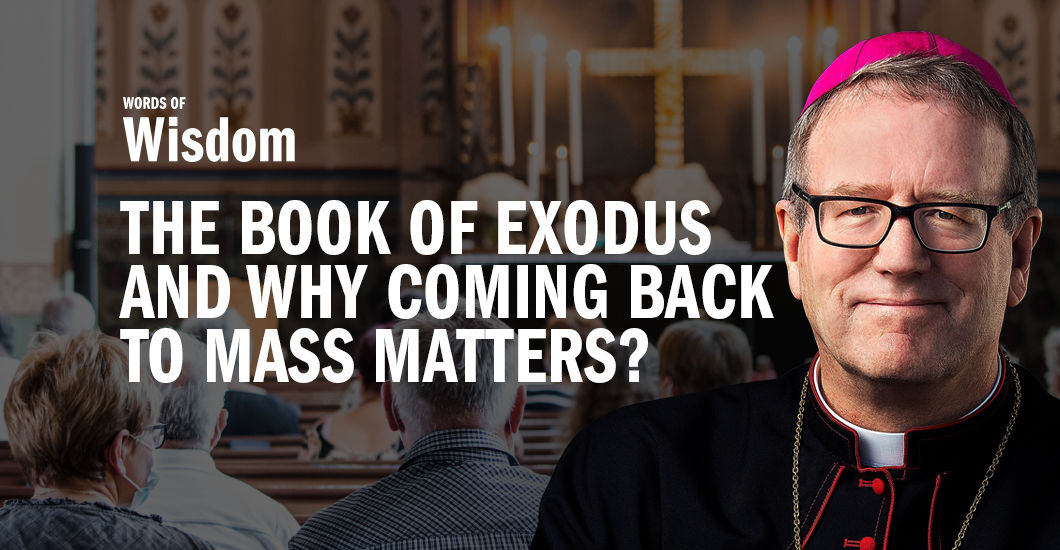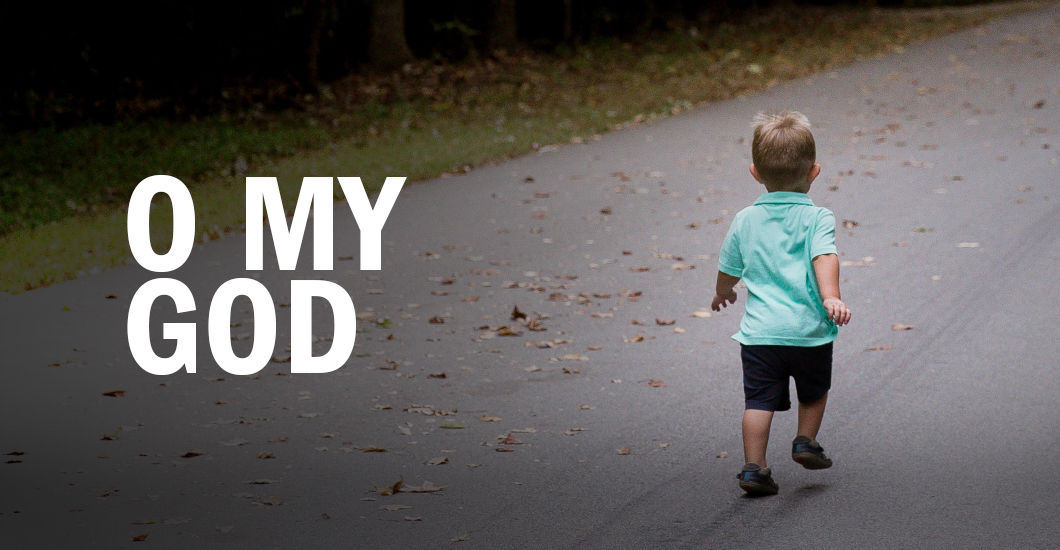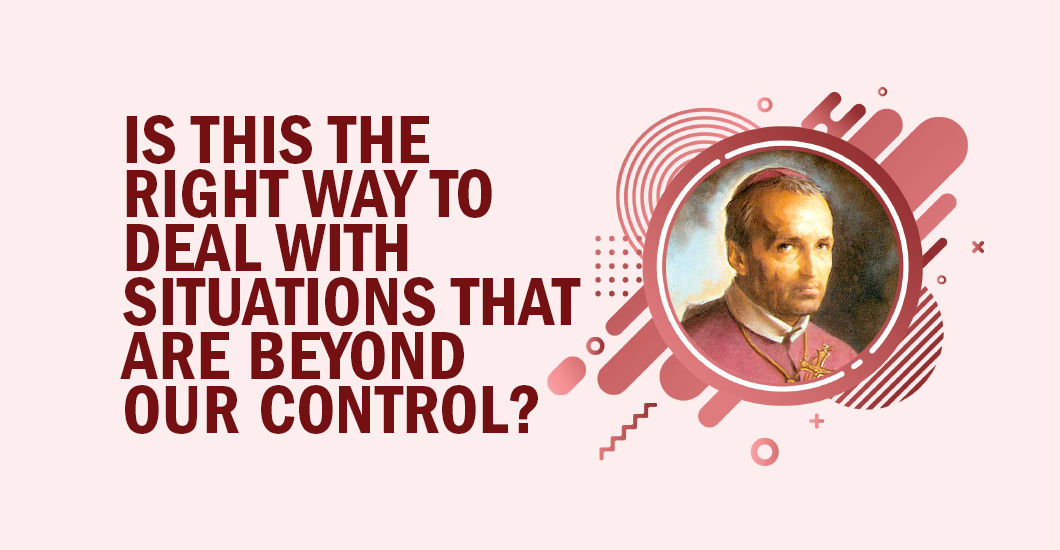- Latest articles

Coping with times of desolation in a new and powerful way!
For many of us even the smallest instances of physical contact and affection go a long way. The chance to speak to someone face to face and look into their eyes offers the soul the gift of connection and affirmation. So, to be stripped of these sustaining blessings has been a massive hardship. To know that we were not free to visit (and embrace) our loved ones was a heavy cross to bear.
This pandemic has created an atmosphere ripe with feelings of isolation, loneliness, helplessness, and frustration at the limitation of freedom.
I remember when I had three children in three years. Never had I felt the loss of personal freedom so distinctly. My time and energy were no longer my own. I felt homebound because even the shortest trip to a store was usually more work than it was worth. The effort of loading everyone into car seats, packing a diaper bag (which could rival a suitcase), and figuring out the logistics of containing three small people convinced me that even a trip out for essentials was too much mental, physical and psychological exertion. If there was an event I wanted to attend, I would have to decline if I couldn’t find babysitters. Because I needed to forego most events, I felt like my freedom had been severely limited.
But this is love.
“Love consists of a commitment which limits one’s freedom – it is a giving of the self, and to give oneself means just that: to limit one’s freedom on behalf of another.”
― Saint John Paul II, Love and Responsibility
Many people are experiencing this right now. They are limited, restricted and feeling completely alone. Many are trying to limit their social and familial encounters in an effort to protect their loved ones. It is a great sacrifice.
But this time of isolation can be highly fruitful and powerful.
“Limitation of one’s freedom might seem to be something negative and unpleasant, but love makes it a positive, joyful and creative thing. Freedom exists for the sake of love.”
― Saint John Paul II, Love and Responsibility
When my freedom was limited for the sake of my small children, I had more time for spiritual reading and engaging in deeper prayer: a consequence of being forced to limit social engagements, events and excursions. I had time for a Rosary that included all the mysteries. Often I would be praying while changing diapers, nursing, and simply being present while my children played. It was a huge change from the life I knew before, but proved to be one of the most spiritually fruitful times in my life.
I am convinced that many of the greatest spiritual battles are being fought and won through the earnest outpouring of the prayer of those who have had their freedom limited: the homebound, those confined to nursing homes and those restricted to hospital beds. In the quiet corners, outside of society’s periphery, Rosaries, offerings and persistent pleas are sent up daily to the Lord. Those isolated in their homes and those with physical challenges reside in their own personal monastic environment. Their cloistered reality offers the potential for turning their world into a powerhouse of prayer – and that is exactly what the world needs most right now.
'
Did you wake up today to lead a mediocre life?
You are called to a greater, better and higher plan.
Signs and Wonders
“Truly, I say to you, he who believes in Me will also do the works that I do; and greater works than these will he do, because I go to the Father. Whatever you ask in My name, I will do it, that the Father may be glorified in the Son; if you ask anything in My name, I will do it.” (John 14:12-14).
Yes, you have read that correctly, Jesus Christ told us we would do greater things than Him! Greater things than God Who took on human flesh and dwelt amongst us! Can we really take that in? Did Jesus mean this literally? How can we interpret that?
Greater than curing lepers, blind people, or deaf people? Even greater than raising the dead? Could it be that Jesus was telling us that we would literally do the works He did, but greater in number since He was ready to ascend to His Father? Do we really believe that when Jesus told us that ‘signs’ would ‘accompany those who believe’, He was talking to us. That He literally meant it when He said ‘in my name they will cast out demons; they will speak in new tongues; they will pick up serpents, and if they drink any deadly thing, it will not hurt them; they will lay their hands on the sick and they will recover’ (Mark 16:17-18).
For the past few years I have volunteered with a local charity in my home city of Manchester, England, where different local Christian churches, of different denominations, take it in turns to host homeless asylum seekers every night of the week—giving them a bed for the night, food in the evening and breakfast in the morning before they leave. On Saturday night it was the turn of my Citycentre Catholic church. I was often blessed to be part of the sleepover team, staying over and sharing meals. Simply spending time with these beautiful men was a blessing beyond words. Many of them were Muslim.
Chaos Theory
There were many miracles over the years. One in particular stands out, in a supernatural way. The night started, as usual, when I set off with another volunteer, a good friend of mine, to collect the men. As we rang the bell and entered the building, I was met by a lady who gave me a piece of paper with a name on it. She told me it was the name of a man who had been brought in earlier by the police from the streets in a stupor from taking drugs. Although she assured me that he was okay now after sleeping it off, I wasn’t happy with that and asked to see the man myself. When we met, I looked into his eyes and saw such darkness. I felt instantly repelled, so I told him that, unfortunately, he would be unable to stay with us that night. This was difficult because I knew it meant a night on the streets for him, but it was clearly not the right thing for him to come and stay. I explained that we had been informed he had taken drugs, that there were women at the shelter, and we had the other men to think about too.
We could not babysit one man and neglect the rest. Although he insisted that he would be okay, I told him sadly that it would not be possible for him to stay with us that night because the charity had a zero tolerance policy on drugs. He started shouting and swearing that he would go anyway, but I told him that he would not be let in without us. As he stormed off into the night, a fight broke out in another part of the room with two other men. It was chaos from the word go! Consequently, I had to inform a second man that he couldn’t join us. This also didn’t go down well. I assured him of our prayers, but this was little consolation to a man who was already irate, troubled, and probably intoxicated.
Advising God?
As we walked off together, the other men came to shake my hand, thanking me for not allowing the two men to join us since they had both caused many problems for them each night. They were relieved and so grateful for a night’s peace. As we walked along, we encountered a police van with flashing lights in the middle of the road. A police officer shouted orders for everybody to get back, stretching out his arms to keep people away from a man who lay on the ground unconscious. Another policeman knelt beside him checking his neck for a pulse because he had stopped breathing. I quickly realized that it was the first Muslim man who had stormed off minutes earlier. Immediately, I swooped under the policeman’s arms and knelt down placing my hands on him.
“What do you think you’re doing?” yelled the policeman, but I insisted that I needed to pray for him. Immediately, I called upon the Lord. ‘You breathed life into this world at the beginning of time, breathe life into this man. Jesus, You called Your friend Lazarus from the tomb, please raise this man now’. I hesitated as I thought to myself, “Who do I think I am to advise God with earthly words? This is God I am addressing.” How inadequate my human words were. It was coming from my heart, of course. Then I began to pray using the supernatural gift of The Holy Spirit which I have been blessed with—the gift of praying in tongues (1 Corinthians 12:1-11 & 1 Corinthians 14:1-5).
When My Heart Sunk
Saint Paul tells us that ‘The Spirit helps us in our weakness; for we do not know how to pray as we ought, but the Spirit Himself intercedes for us with sighs too deep for words. And He who searches the hearts of men knows what is the mind of the Spirit, because the Spirit intercedes for the saints according to the will of God’ (Romans 8:26-27). I have no idea how long I knelt there praying, but suddenly the policeman checking the pulse exclaimed, “I can feel a pulse!!!”. My heart sang. I felt elated and could not stop thanking Jesus. Moments later, an ambulance arrived. It was such a blessing to see the heart monitor picking up a heartbeat on the screen. Again, I thanked and praised Jesus with total awe and wonder.
I had been totally oblivious to my surroundings since I had acted purely on instinct. I believe that it was God who urged me instantly to this man’s side. As I stood up, I realized that a bigger crowd had gathered. Again I was greeted with handshakes from the asylum seekers, thanking me for being open enough to pray for him.
A few weeks later, I was volunteering again at the night shelter when another Muslim man came up to me with a massive smile on his face, eager to tell me about this man that I had prayed with. He told me that the man had been addicted to drink and drugs ever since he arrived in England three years ago. When he had bumped into him just a few days earlier, he was no longer addicted to drink and drugs so he was no longer sleeping on the streets because he had moved into his own home. I was amazed all over again and praised God. However, The Lord was not finished there. In the midst of this beautiful moment, I was able to perceive a deep pain in this man sitting before me. I was able to share the Gospel with him and we prayed together. We have a God who never stops pouring out blessings.
God, indeed, is great!
We must have faith. Jesus tells us the smallest seeds of faith are enough to move mountains (Mark 11:22-25) and ‘with God all things are possible’ (Matthew 19:26). Our Triune God, The Creator, The Redeemer, and The Sanctifier; Father, Son and Holy Spirit lives inside each baptized Christian believer. We must really believe that and live it. ‘Jesus Christ is the same yesterday and today and for ever’ (Hebrews 13:8) and His words are ‘Spirit and life’ (John 6:63).
'
How to begin a conversation with someone you care for? Here’s a simple tip you shouldn’t miss.
Joy of Chewing
I have taken seriously the apostle Paul’s advice to “speak the truth in love” (Ephesians 4:15). Often, with good intentions, I have run with that advice and tried to share the truth with others. But more times than not the result has been disappointment, disagreement, and misunderstanding. Have you ever experienced this? As I pondered why I have encountered this negative outcome I asked myself what words of wisdom my Blessed Mother might have for me, Immediately, loud and clear, I heard her words to the servants at Cana: “Do whatever he tells you” (John 2:5). But that was not all.
As I journeyed through the Gospels with my hand in hers, I remembered what is said about her in Luke’s Gospel at the end of the infancy narrative: “His mother kept all these things in her heart” (Luke 2:51). That helped me begin to understand why my impulsive efforts did not bear good fruit: I need first to observe / study / ponder through the eyes of Mary and I need to understand how Jesus spoke the truth in love before I try to imitate His action. I need to discover, and sometimes rediscover, the joy of chewing the Word of God rather than simply swallowing it. So how did Jesus speak the truth in love?
Tinge of Frustration
An early example of Jesus speaking the truth in love is found in Jesus’ encounter with the rich young man. In response to the young man’s question about what he must do to inherit eternal life. Jesus points to those commandments that call us to love our neighbors as ourselves. Of these commandments, the young man says, “Teacher, all of these I have observed from my youth” (Mark 10:20).
Jesus’ starting point in this discussion is what the young man does well–those actions, ideas and thought patterns which in the young man are commendable and praiseworthy. But the most telling observation is what follows. Marks account goes on to tell us that “Jesus, looking at him, loved him,” (Mark 10:21). Here is revealed Jesus’ starting point: love. Jesus begins with love for the one to whom He will speak a hard truth.
When discussing matters of faith with another person, if my effort in sharing the Good news of the Gospel seems fruitless, I must admit I feel frustration. Yet in this story, Jesus, who knows exactly how the young man is going to respond to His invitation, looks at him and loves him rather than experiencing the slightest irritation. Jesus knows, at that moment, that the young man is going to feel sadness and walk away. But perhaps the Lord is filled with hope that later the young man may yield to the grace offered in his encounter with Jesus.
Do we do what Jesus did? Do we begin with love when we have truth to share?
You Are the Man
Another helpful lesson about how to speak the truth in love comes from the Old Testament in the passage where Nathan, the prophet, confronts King David about his serious sins of adultery and murder (2 Samuel 12). The key question in this encounter is why Nathan begins by telling David a parable about a rich man who acts unjustly toward a poor man? Why not come straight to the point and tell David he has committed a grave injustice against another human being?
As David listens to Nathan’s fictional story, we learn that he grows terribly angry with a man who he believed had behaved so unjustly toward his neighbor (2 Samuel 12:5), Nathan does not begin by confronting David with his mess, but by evoking the sense of justice that lay deep within his heart. If David were not a just man, he would not have expressed intense anger toward the rich man of the parable, demanding to know his name. When Nathan spoke those famous words “You are the man,” David responded with deep repentance, which later the Psalmist expressed so beautifully in Psalm 51. So, if any of us are ever called upon to discuss with someone their moral choices we would do well to follow Nathan’s example and begin by evoking the good in the individual, and resist the temptation to be in a hurry to expose their mess?
The End Zone
A second Gospel example that shows how Jesus spoke the truth in love is found in the encounter between Jesus and Peter following the Resurrection (John 21:15-18). On the lakeshore, after He has fed the disciples breakfast, Jesus asks Peter three times, “Simon, son of John, do you love me?” As we know, Peter is wrestling with the tremendous guilt and shame of having denied his Lord three times. Where does Jesus begin this dialogue? He begins with the fact that Peter does genuinely love Him.
Father Daniel Poovannathil an acclaimed preacher from Kerala, southern India, shares these insights. When Jesus was arrested in the Garden of Gethsemane, Peter knew this was not going to end well for Jesus. But he did follow, although at a distance, showing that he was, in a way, risking his life. His main struggle was between faithfulness and fear. Finally, when he was confronted, he succumbed to fear and denied Jesus. But Luke adds this additional detail stating, “the Lord turned and looked at Peter.”
Father Daniel explains that unlike Judas, Peter did not despair to the point that he fell out of Jesus’ line of sight. His love for Jesus as his Lord landed Peter in the ‘end zone’, despite his shameful act in a moment of weakness. So, when Jesus turned and looked, it was as if His vision cast a net that drew Peter in and held him until Jesus could tangibly minister to his soul.
When we confront people who know they have messed up, where do begin the conversation?
In conclusion, let us ask ourselves, “Do I see myself in any of the scenarios described above?” Do I begin difficult encounters in the same way as Nathan and Jesus did?
The inspiring Catholic speaker, Dr. Mark Nimo, often says, “Our story did not begin with sin, it began with love.” If Jesus is willing to approach sinners first with what is good in them, should I not do likewise?
Dear Jesus help me to speak the truth in love just as You did. Let my words build up those around me. Even if disappointment seeps in, let me see through Your eyes and trust that Your lifegiving message will enter every heart. I pray especially for those who have lost their way. May Your Spirit guide my every word and make me a source of love and healing. Amen.
'
Here are 3 ways to help you fight the good fight
Why do we so often avoid the things we want to do and indulge in those we don’t? Saint Paul couldn’t figure it out either (see Romans 7:15). And why does it take a pandemic to remove unwanted distractions from our lives? It seems to be an unfortunate part of our human nature. But perhaps the current pandemic that has brought serious illness and death around the world can help us overcome some aspects of our stubborn human natures.
Social distancing has been challenging in many ways for many people, but ironically for some it has also proven useful and beneficial. The greater time alone many experienced is providing unexpected opportunities to focus on what’s really important and to draw closer to God. When these restrictions ease, it will be all too easy to fall back into our old habits. So, to maintain whatever progress we’ve made, let’s do what good Catholics do—get our hands dirty, dust off the Rosary beads, light candles on the family altar and lift our minds heavenward as we examine three simple steps that can keep us from losing ground.
Pray without ceasing
While it is wonderful that your prayer life may have become more fervent during this time of crisis, remember that it is generally easier to pray when we have a determined and pressing intention on our mind. So, when things ease up, be mindful not to lose this zeal by becoming lax.
Don’t change your prayer time to fit your routine as you reestablish your new ‘normal’, change your routine to fit your prayer time. If you have managed to allocate more time to prayer, meditation, and contemplation during the pandemic, strive to maintain your routine when schools and workplaces resume operations.
Find solutions that fit your circumstances: podcasts or CDs you can play in the car on your commute, family Rosary around the dinner table while the littlest kids are still strapped into their highchairs, family Lectio Divina or Bible reading in the evening.
Make Sunday more than an obligation
Attending Mass and receiving Our Lord in the Eucharist sounds appealing to many of us right now. Lack of access to the sacraments makes us long for them. As they say, ‘you don’t know what you’ve got till it’s gone.’
But will we retain our longing for the Mass once we are able again to attend freely? It will take effort to approach each Mass with the same intensity we feel now. Otherwise, at some point after our churches are reopened, we may find ourselves growing complacent and treating our faith like an obligation rather than the gift and privilege it is.
Pondering this very idea, Josemaria Escriva said, “Many Christians take their time and have leisure enough in their social life (no hurry here). They are leisurely, too, in their professional activities (no hurry here either). But isn’t it strange how those same Christians find themselves in such a rush and want to hurry the priest in their anxiety to shorten the time devoted to the most holy sacrifice of the altar?”
How can we dedicate more of our time to God?
Make Sunday—the whole day—one dedicated to the Lord. Yes, attend Mass, but don’t stop there. Build community at your parish. How about morning teas after Mass, or perhaps invite another Catholic family to your house for tea or lunch? Maybe you could try to get to Mass early, make use of the Sacrament of Confession, offer a Rosary together as a family, or spend time in quiet prayer?
Pare back the extras
Lockdown and social distancing have drastically altered the number of ways we can spend our time. Perhaps the pandemic has invited us to think about the activities in our lives. Which do we miss, and which do we not miss at all? Which do we need, and which don’t we need?
Are we overscheduled? Do all our activities cause us stress and create logistical nightmares? Do our children need to attend every extracurricular activity there is? Are we failing them if we limit their extra-curriculars, or are we doing them a greater service? Perhaps it’s time to ‘Marie Kondo’ those extracurricular activities so you can find a healthy balance for your family.
Less time in structured activities means more unstructured time together as a family, and it’s the unstructured activities that make for the best quality time. Spontaneous board games, baking cookies, and unplanned bike rides make memories children will treasure.
The pandemic has given us an opportunity to assess our prayer lives and priorities. No doubt the suffering and challenges we face during this time will be accompanied by graces that will help us make changes for the better.
There is no time like the present to take stock of our lives.
'
Feeling lonely can be detrimental. Here’s 5 ways to overcome loneliness.
The Covid19 Pandemic that surged throughout 2020 took everyone out of their comfort zone—rich or poor, young or old, healthy or non-healthy, well-educated or less-educated from every race, culture and religion. The pandemic made people feel isolated—from the outside world, from their loved ones, from their kids, from their spouses, from their houses of worship, from their priests, pastors and rabbis, from their counselors and therapists, from their friends and co-workers, from their parents and grandparents and from building human connections. The pandemic has increased the feeling of loneliness in many people, leading some to desperate measures.
Feeling lonely creates a void in our hearts; we long to find someone to help us, to hug us, to care for us and pay attention to us. No one wants to feel lonely! But people can feel lonely even when in a relationship or among friends. Loneliness can come at any moment in our lives and at any age.
Loneliness can be triggered by a major event like a break-up or divorce and by lesser events like feeling overwhelmed or feeling out of place. Thinking of a particular event or tragedy can also trigger feelings of loneliness. But with every struggle, God can provide hope, comfort, and strength to anyone who seeks him.
Overcoming loneliness is not easy. It is a process that requires constant practice. The best way I have found to overcome loneliness is to place my trust in God. But we know that grace builds on nature and so we must also seek out the many practical strategies that also can help.
Here are five positive steps I believe can help you cope with and overcome loneliness.
1.Ask for help when feeling lonely and feeling overwhelmed! Reach out to people who are reliable and trustworthy.
2.Identify and engage in activities that bring you joy, that make you smile and keep you positive mentally, emotionally, and physically.
3.Fill your soul with spirituality—read the Bible, enroll in a Bible study or social weekly fellowship, pray privately or in groups and with family, pray online or on the phone.
4.Practice almsgiving by giving to a cause dear to your heart. Make a positive difference in other people’s lives by volunteering your time and talents. Giving yourself to others will lessen your feelings of loneliness.
5.Distance yourself from negative social media platforms and negative followers. Create a positive public forum to promote healthy spiritual conversations. See a Pastor or Counselor if your loneliness persists despite your efforts to deal with it.
Try these steps to deal with your loneliness. Taking action will almost always result in a better mood. But remember that in challenging and uncertain times, trust in God is our best strategy.
'
In connection with an academic project of mine, I’ve recently been poring over the book of Exodus and numerous commentaries on it. The second most famous book of the Old Testament is concerned primarily with the manner in which God shapes His people, so that they might become a radiant beacon, a city set on a hill. On the biblical reading, Israel is indeed chosen, but it is never chosen for its own sake, but rather for all the nations of the world.
I would say that this formation takes place in three principal stages: first, God teaches Israel to trust in His power; secondly, He gives Israel a moral law; and thirdly, He instructs his people in holiness through right praise. The lesson in trust happens, of course, through God’s great act of liberation. Utterly powerless slaves find freedom, not by relying on their own resources, but rather upon the gracious intervention of God. The moral instruction takes place through the Ten Commandments and their attendant legislation. Finally, the formation in holiness happens through a submission to an elaborate set of liturgical and ceremonial laws. It is this last move that perhaps strikes us today as most peculiar, but that has, I will argue, particular resonance in our strange COVID period.
That education in religion involves moral instruction probably seems self-evident to most of us. And this is because we are, willy-nilly, Kantians. In the eighteenth century, the philosopher Immanuel Kant contended that all of religion is reducible to ethics. What the religious thing is finally all about, Kant argued, is making us more just, loving, kind, and compassionate. In contemporary language, Kantianism in religion sounds like this: “As long as you’re a good person, it doesn’t really matter what you believe or how you worship.”
Now, there is no question that the book of Exodus and the Bible in general agree that morality is essential to the proper formation of the people of God. Those who would seek to follow the Lord, who is justice and love, must be conformed to justice and love. And this is precisely why we find, in the great Sinai covenant, injunctions not to steal, not to commit adultery, not to covet, not to kill, etc. So far, so Kantian.
But what probably surprises most contemporary readers of the book of Exodus is that, immediately following the laying out of the moral commandments, the author spends practically the rest of the text, chapters 25 through 40, delineating the liturgical prescriptions that the people are to follow. So for example, we find a lengthy section on the construction of the ark of the covenant: “They shall make an ark of acacia wood; it shall be two and a half cubits long, a cubit and a half wide, and a cubit and a half high. You shall overlay it with pure gold, inside and outside you shall overlay it.” And as an ornament on the top of the ark, “You shall make two cherubim of gold. . . . Make one cherub at the one end, and one cherub at the other. . . . The cherubim shall spread out their wings above, overshadowing the mercy seat.” Next, we find instructions regarding the elaborate furnishings inside of the tabernacle, including a lampstand, a table for the so-called “bread of the presence,” pillars and various hangings. Finally, an enormous amount of space is given over to the description of the vestments to be worn by the priests of Israel. Here is just a sampling: “These are the vestments that they shall make: a breastpiece, an ephod, a robe, a checkered tunic, a turban, and a sash. When they make these sacred vestments. . . . They shall use gold, blue, purple, and crimson yarns, and fine linen.”
No indication whatsoever is given that the moral prescriptions are somehow more important than the liturgical prescriptions. If anything, the contrary seems to be the case, since Exodus is followed immediately by the book of Leviticus, which consists of twenty-eight chapters of dietary and liturgical law. So what are we post-Kantians to make of this? First, we should observe that the biblical authors do not think for a moment that God somehow requires liturgical rectitude, as though the correctness of our worship adds anything to his perfection or satisfies some psychological need of His. If you harbor any doubt on this score, I would recommend a careful reading of the first chapter of the prophet Isaiah and of the fiftieth psalm. God doesn’t need the Ark and the Tabernacle and priestly vestments and regular worship, but we do. Through the gestures and symbols of its liturgical praise, Israel is brought on line with God, ordered to him. The moral law directs our wills to the divine goodness, but the liturgical law directs our minds, our hearts, our emotions, and yes even our bodies to the divine splendor. Notice how thoroughly the ceremonial instructions of Exodus involve color, sound, and smell (there is an awful lot about incense), and how they conduce toward the production of beauty.
I said above that Exodus’ stress on the liturgical and ceremonial has a profound relevance to our time, and here’s why. For very good reasons, we abstained completely from public worship, and even now our ability to worship together is very limited. In most dioceses in our country, the obligation to attend Sunday Mass is, again for valid reasons, suspended. My fear is that when the propitious moment arrives, when we are again able to return to Mass, many Catholics will stay away, since they’ve grown accustomed to absenting themselves from worship. And my concern takes a more specifically Kantian form: Will many Catholics say to themselves, “You know, as long as I’m basically a good person, what’s the point of all of this formal worship of God?”
Could I recommend that you take out your Bible, open to the book of Exodus, especially chapters 25 through 40, and consider just how crucially important to God is the correct worship offered by his holy people? Liturgy has always mattered. The Mass— involving vestments, ritual gesture, smells and bells, song and silence—still matters, big time. Isn’t it enough that you’re a good person? Not to put too fine a point on it: no.
'
What’s the greatest antidote to loneliness?
It was an ordinary Sunday evening at the students’ boarding house where I was staying. Most of my friends had gone home for the weekend. After finishing my chores and studies for the day, I got ready to attend evening Mass at the small convent Chapel nearby. By the time I headed towards the Chapel, a heavy feeling of loneliness was overwhelming me. Besides the fact that I was miles away from family, something else was burdening me, but I could not quite place my finger on it. Loneliness was nothing new to me. I had already spent more than 6 years in college/university boarding, only able to visit my parents, who were working in another country, during semester breaks.
When I reached the chapel, I was surprised to see it full of people, which was unusual. However, I managed to find a spot in the front pew and settled down, still engrossed in my thoughts. The Mass progressed, but I was unable to concentrate on the prayers. As the time for Communion approached, the ache inside had grown. I joined the Communion line and on receiving Jesus, came back to kneel down in thanksgiving.
The next moment, I realized that the intense feeling of loneliness and sadness had vanished! It was as though a heavy weight was lifted off my shoulders in an instant. I was totally taken by surprise at this transformation because I had neither prayed anything much during the Mass, nor said anything to Jesus about what I was feeling. But the Lord was looking down on me from the altar. He knew I was struggling and needed help.
The small incident etched a deep mark in my memory. Even after several years, I remember how the Lord showed his tender care. The Eucharistic Lord has been my refuge during all the difficult moments of my life. Not once has He failed to help me with His grace and mercy. When we feel battered by the storms of life, uncertain how to find the right direction, all we have to do is run to Him. Some of us spend a lot of money to speak with a clinical psychologist, but we often do not realize that the greatest Counsellor is always ready to hear our problems at any time, without an appointment!
There is no greater antidote to loneliness than the presence of God. If you ever feel that no one really understands you or cares about you, go confidently before the Blessed Sacrament. Our Lord Jesus is waiting for you to experience His comfort, strength and overwhelming love!
“The time you spend with Jesus in the Blessed Sacrament is the best time you will spend on earth.” – Saint Teresa of Calcutta.
My Jesus, who is truly present in the Blessed Sacrament, help me to confide in You all my worries about the future. I trust in You and firmly believe that there is nothing impossible for You. Let me be comforted and strengthened by Your overwhelming love. Amen
'
Does God really care about what’s happening in your life? This story, fictional or not, is sure to change your perspective. During the Second World War, a soldier got separated from his unit. The fighting had been intense, and in the smoke and crossfire he had lost touch with his comrades. Alone in the jungle, he heard enemy soldiers approaching. In his desperate search for cover, he scrambled up a high ridge and found some small caves. Quickly he crawled inside one of them.
Although safe for the moment, he realized that if they followed him up the ridge and searched the caves, they would find his hiding place. As he waited anxiously, he prayed, “Lord, please spare my life. Whatever happens, I love you and trust you. Amen”. The heavy tread of enemy boots drew closer and closer.
“Well, I guess the Lord isn’t going to help me out of this one”, he thought dejectedly. Morosely, he watched a spider building a web in front of his cave. “Hah”, he fretted, “What I need is a brick wall and the Lord sends me a spider web. God does have a sense of humour”. As they neared his cave, the soldier prepared to make his last stand, but then he heard someone say: “There’s no point looking in this cave…he couldn’t have entered without breaking that web!”
To his utter amazement, after a cursory glance, they moved on. The fragile spider web had saved him after all. “Lord, forgive me” he prayed. “I had forgotten that You can make a spider web stronger than a brick wall.
“God chose what is foolish in the world to confound the wise! God chose what is weak in the world to shame the strong.” (1 Corinthians 1:27)
'
Wondering how to respond to those comments about your witness to life? Here are 3 best comebacks just for you!
Just last week, I parked our large van out the front of the local shop. After quickly grabbing a few grocery items, I returned to find my children conversing with the occupants of the vehicle parked next to us—a father and his young son.
In a small town such as ours, there are always tenuous links to other people. In this case, the young boy in the utility had attended preschool with our fourth child and wanted to say hello.
The door to our van was opened to accommodate such a greeting.
I could see the father’s mind boggling as he took in the number of children in my vehicle—six—and then noticed the now unmistakable bump announcing the expectation of number seven.
His comment was one of those common ones large families encounter with annoying regularity: “You should get a TV.”
He added an, “or something”, to his comment and an awkward laugh that only proved that he had recognised the rudeness of his comment. But it was too late to take it back.
Smiling a very forced smile, we made our goodbyes and headed home. This was not the first time I had encountered such comments, and it would not be the last. The truth of the matter is that the size of my family is somehow confronting to a large proportion of society.
“They just can’t understand,” says a friend, and mum of six, “what joy we experience in being blessed with a large family.”
She is right. Being blessed with a large family is something very different to adhering to the 2.1 children per family and, from the outside, appears very counter cultural.
Of course, it is counter cultural, but it should not be. Not all of us are called to have a ‘large’ family but we are called to be open to life. For some, this does mean a large family, but for others it means a small family, dealing with and encountering pregnancy and infant loss, struggles with fertility, fostering, or adoption.
Regardless of the size or make-up of our family, we can all witness to the profound blessing of being open to life.
1. Radiate Joy
The news of a new pregnancy should be a time of great joy. There are some times and some situations, when this news might be more subdued.
Regardless, a new life should always be celebrated.
When you encounter others, whether they share your open-tolife outlook or not, let them see the joy that this announcement carries with it for you.
Joy is infectious—and something often sadly lacking in our world today.
Maybe they still cannot understand why you would want to have your fourth, sixth, seventh or eleventh child, but they should still be able to leave their encounter with you knowing that you are delighted to be expecting another bundle of joy.
2. Respond with humor, not anger
There are any number of rejoinders one could give to those clichéd phrases: “Don’t you have a TV?” or, “Don’t you have your hands full?” and so on. But some are probably not charitable.
We are not going to change hearts with our angry response. Or, let us be honest, with whatever response we give. But, perhaps we can sow a seed.
A mother within my acquaintance likes to tell the following story of one mother’s response to the following questions: “Why do you have so many children? Or, you’re having another one?”
The cheeky response: “We’ll keep going until we get one we like!” Or, alternatively: “We’re just making sure we have plenty of children to look after us in our old age.”
Maybe these quips are not for everyone. But humor can be a great tool in responding to the more puzzled queries of the more secular among us.
Saint John Cantius encourages us to: “Fight all error, but do it with good humour, patience, kindness, and love. Harshness will damage your own soul and spoil the best cause.”
Maybe adding a dose of humor will be just the thing.
3. Witness without words
Although I have been on the receiving end of less than ideal comments about our family size, I have also been on the receiving end of the most beautiful ones too.
One older lady in particular began with the clichéd: “Haven’t you got your hands full?” and added, “and aren’t you blessed?”
Of course she is right. We are incredibly blessed and those who know us, know that our openness to life extends much further than our own home.
We have had people come to us for help, guidance and support in the face of unplanned pregnancies, difficult post-birth periods, undertaking fostering or adoption, and the general ups and downs of parenting. Often acquaintances who are not Catholic seek our counsel. By the virtue of our family size, we somehow broadcast our sincere belief that all lives are precious.
This has been an unintended consequence of having a large brood. In and of itself, it has been an immense blessing for us to support others.
Without deliberately intending to, we are following the advice of Saint Francis of Assisi: “Preach the Gospel at all times. When necessary, use words.”
So, although you can expect impertinent comments, that does not mean that you should tone down your own enthusiasm when sharing the news of a pregnancy—whether it’s yours or anyone else’s.
Respond with joy and humor, continuing to witness to the preciousness and dignity of all human life.
'
When I look into the future, I am frightened,
But why plunge into the future?
Only the present moment is precious to me.
As the future may never enter my soul at all.
It is no longer in my power,
To change, correct, or add to the past;
For neither sages nor prophets could do that.
And so, what the past has embraced I must entrust to God.
O present moment you belong to me, whole and entire.
I desire to use you as best as I can
Although I am weak and small,
You grant me the grace of Your omnipotence.
And so, trusting n Your mercy,
I walk through life like a little child,
Offering you each day this heart
Burning with love for your greater glory.
'
When it is hot and humid, cold and windy, or during an epidemic, people often resort to expressions like: How unbearable the heat! How piercing the cold! What a tragedy!
Is this the right way to deal with situations that are beyond our control?
Saint Alphonsus Ligouri in his book, “Uniformity with God’s Will”, narrates an incident that happened in the life of Saint Francis Borgia:
Late one night Father Francis Borgia arrived unexpectedly at a Jesuit house during a snow storm. He knocked several times on the door but to no avail. They were all asleep. In the morning all in the community were greatly distressed and embarrassed to know that he had to spend the whole night in the open. Father Francis comforted them saying that he enjoyed the greatest consolation during those long hours of the night by imagining that the Lord was showering snowflakes upon Him from Heaven.
Saints are full of imagination!
How often have we lamented over natural weaknesses of body or mind? If only I had a brilliant mind, or a more robust body, I would have done wonders. But perhaps if I were more talented, athletic or attractive, I may have lost my soul! Great talent and knowledge have caused many to be puffed up with the idea of their own importance and, in their pride, they have despised others. How easily those who have these gifts may fall into sin and gravely endanger their salvation! On the contrary, how many who suffer poverty, infirmity or physical deformity have become saints! Let us be content with what God has given us. Only one thing is necessary and it is not beauty, not strength, not talent. It is the salvation of the immortal soul.
'